全国英语等级考试(一级)模拟试题
23年全国英语等级一级考试真题
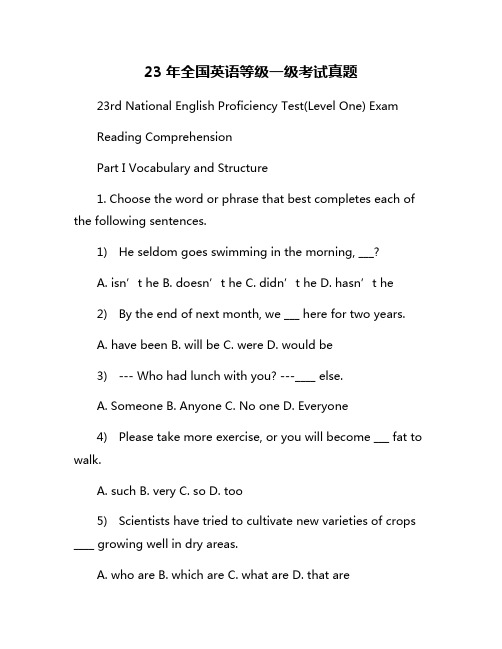
23年全国英语等级一级考试真题23rd National English Proficiency Test(Level One) ExamReading ComprehensionPart I Vocabulary and Structure1. Choose the word or phrase that best completes each of the following sentences.1) He seldom goes swimming in the morning, ___?A. isn’t heB. doesn’t heC. didn’t heD. hasn’t he2) By the end of next month, we ___ here for two years.A. have beenB. will beC. wereD. would be3) --- Who had lunch with you? ---____ else.A. SomeoneB. AnyoneC. No oneD. Everyone4) Please take more exercise, or you will become ___ fat to walk.A. suchB. veryC. soD. too5) Scientists have tried to cultivate new varieties of crops ____ growing well in dry areas.A. who areB. which areC. what areD. that are6) Jane makes more mistakes in Chinese than in English, ____?A. doesn’t sheB. isn’t sheC. doesn’t JaneD. isn’t Jane7) I____ your help even if I had made great progress in English.A. still neededB. needC. would still needD. should needPart Ⅱ Reading ComprehensionsText 1September is a special month for students and teachers in Japan. In early September, students return to school after a6-week summer vacation. In Japan, schools operate on a trimester system. The school year is divided into three terms or the end of March. The first term begins in April and ends inmid-July. The second term starts in early September and continues until the third week of December. The third term begins in early January and ends in mid-March. The school summer vacation covers all of August.The new school year begins on April 1 and the entire nation waits for these beginnings. The first day of the school year for each school is a big day for ceremonies that include the students, their parents, and local officials. The first day of a new term hasspecial significance. Since the arrival of spring is an important event, these occasions are also symbolic beginnings of the new school year. Decorating the house with cherry blossom branches is a Japanese custom that symbolizes a new beginning.This is the time of year when great attention is paid to planting rice. Not only is the weather important but so is the quality of the spring water that irrigates the fields. The rice planting season begins in the middle of April and continues until the end of June. When the rice crop matures, the harvest season and school summer vacation dealsText 2The adaptive role lies in the fact that language is used to communicate the speaker’s attitude and feelings towards the world rather than information transfer.Language does not directly mirror reality. Rather, it represents perceptions on reality. Language is a loosely tied to referent objects and thereby subject to abstraction. Such abstraction gives languages the necessary flexibility to expend their functionality of expressing thoughts about the world we experience. This communicative aspect of language is particularly vivid in humor, irony, or sarcasm. The cleverre-negotiation of social reality via various strategies is acommunicative achievement but also a means of social regulation.There have been various hypotheses on how language processing, or discursive creativity, becomes possible with distributed brain regions. They converge on the assumption that language is processed within a distributed network incorporating domain-specific as well as domain-general brain regions. For symbolic processing such as language, the prefrontal cortex, located at the frontal (intelligence) lobe, would be important. This brain region would regulate the activation of stored representations in long-term memory.Part Ⅲ Translation1.At the factory, the managers and the workers work closely together.2.It is said that by the end of next year, all the families in that small village will have moved to the new town.3.Although the young man is not a student, he knows five foreign languages well.4.The newly built bridge across the river was completed in just three months.Listening ComprehensionPart A1. [A 1] 【例1】A. 3:30. 【例2】B. 9:30 【例3】C. 9:40 【例4】A. Peter2. A. Sharon knows Peter EHEDI 33 B. Sharon knows Peter GEHDI 333. A. Sharon is at home and her sister JAMS 75 B. Sharon is GBDDT 75 and her sister4. A. Sharon DABHIC 39 castles 1961 B.Sharon ADAPBGEJ 1395.A. The weather should be clear and cool today.B. It's going to rain in the afternoon.C. The weather has been rainy for a long time.Part BSection1 Conversation AMan: Can I help you? Is there anything you want to know?Woman: Yes, I just want to know when the new library will be open to the public, please?Man: Yes, it will open from 8:30 a.m. to 5:00 p.m. from Monday to Saturday.Woman: Good, thank you very much.Section 2 Ramp and Parking FacilitiesThe Skywalk has a ramp with an average grade of 7 percent. It is equipped with handrails on both sides and at a height of 36 inches. The parking facility is provided at the adjacent Pinnerras International Raceway. It has an elevator to help physical handicaps.Section 3 Ordering Menu ItemsA: Good evening. Thank you for calling Mr. Lee Restaurant. What can I get for you tonight?B: I am having a small party at home. I need to order some food.A: No problem. We have a wide range of party-food options. May I take your order?B: Sure. I’d like to order 3 large pizzas, 2 dozen wings, 1 dozen mozzarella sticks, and 1 large salad.A: Will that be for pick-up or delivery?B: For delivery, please.A: Got it. That will be ready in about 30 minutes. Thank you for choosing Mr. Lee Restaurant.WritingSection ACloze PassageMexico's road system ∥ stretches over 366,366 kilometers throughout the country, the nation has the second longest paved road system in Latin America after Brazil. Also, the number of users has ∥ increased and the use of non-diesel vehicles is also on the rise. All key attractions can be accessed successfully by road. The Pan-American Highway, often ∥ denoted as Highway 1, offers smooth access to the country via Tijuana.Situations: 1) A. initially B. partially C. neverD. significantlyB. significantlyInformationA. unfortunatelyB. distinctlyC. surprisinglyD. steadilyB. steadilyInformationA. generallyB. reasonablyC. excellentlyD. rarelyC. excellentlyInformationA. commonlyB. alternativelyC. hardlyD. dedicatedlyD. dedicatedlySection BEssay WritingDirection:For this part, you are allowed 30 minutes to write a short essay on the value of a university education. You should write at least 150 words following the outline given below:1.现今大学教育被认为是获得成功与个人发展的重要途径之一2. 大学教育的收获3. 个人观点With the rapid development of society, university education has been recognized as one of the key pathways to success andpersonal development. The benefits of a university education are manifold. Firstly, it provides students with valuable knowledge, skills, and experiences that are essential for entering and advancing in the workforce. Moreover, university education encourages critical thinking, creativity, and problem-solving capabilities, which are crucial for adapting to the changing job market and achieving long-term success. Additionally, universities offer students opportunities to expand their social networks, build lifelong friendships, and participate in extracurricular activities that facilitate personal growth. In my view, university education is invaluable not only for acquiring academic qualifications but also for fostering personal development and preparing for a fulfilling future.Overall, the 23rd National English Proficiency Test (Level One) Exam covers a range of language skills such as vocabulary and structure, reading comprehension, listening comprehension, translation, and writing. Students are required to demonstrate their proficiency in English through a series of challenging tasks that test their ability to understand and effectively use the language. By successfully completing this exam, students can enhance their language skills and demonstrate their readiness to communicate in English proficiently.。
全国英语等级考试(PETS)考试:2022全国英语等级考试(一级)真题模拟及答案(3)
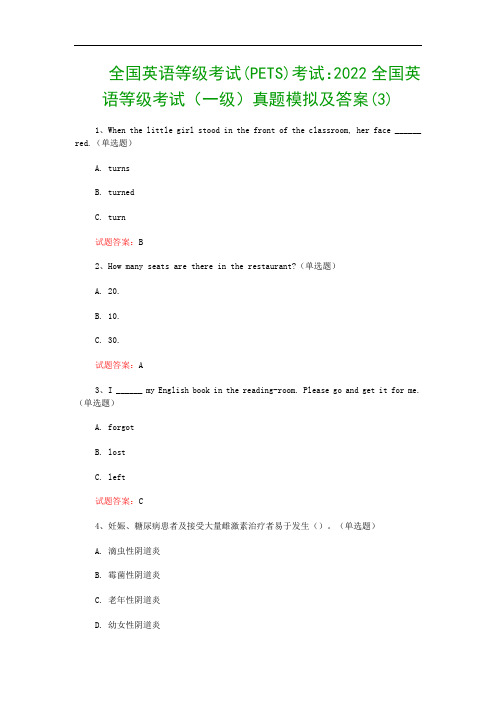
全国英语等级考试(PETS)考试:2022全国英语等级考试(一级)真题模拟及答案(3)1、When the little girl stood in the front of the classroom, her face ______ red.(单选题)A. turnsB. turnedC. turn试题答案:B2、How many seats are there in the restaurant?(单选题)A. 20.B. 10.C. 30.试题答案:A3、I ______ my English book in the reading-room. Please go and get it for me.(单选题)A. forgotB. lostC. left试题答案:C4、妊娠、糖尿病患者及接受大量雌激素治疗者易于发生()。
(单选题)A. 滴虫性阴道炎B. 霉菌性阴道炎C. 老年性阴道炎D. 幼女性阴道炎E. 淋球菌性阴道炎试题答案:B5、Amanda hasn’t told me ______ she plans to do after dinner.(单选题)A. whereB. whatC. how试题答案:B6、The suggestion ______ all right.(单选题)A. has soundedB. is soundedC. sounds试题答案:C7、What do you think “florists” do?(单选题)A. They sell flowers.B. They make bread.C. They sell clothes for Mother’s Day and Father’s Day.试题答案:A8、The policeman told the boys ______ in the street.(单选题)A. not to playB. don’t playC. not play试题答案:A9、Hurry up. Don’ t keep Xiao Wang ______(单选题)A. waitC. waiting试题答案:C10、不能为诊断"新生儿破伤风"提供线索的是()。
23年全国英语等级一级考试真题
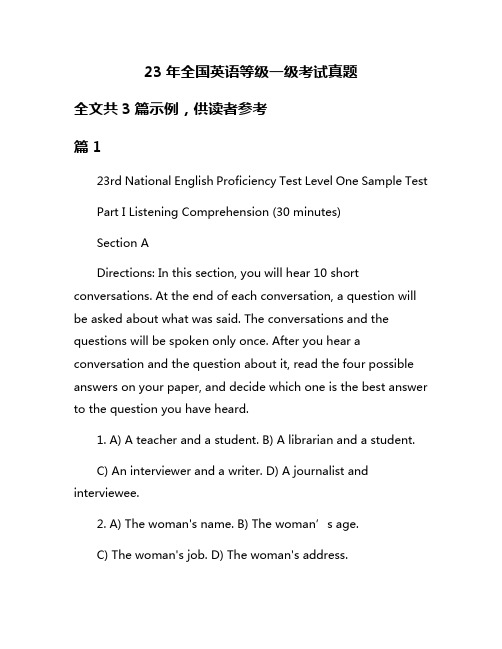
23年全国英语等级一级考试真题全文共3篇示例,供读者参考篇123rd National English Proficiency Test Level One Sample TestPart I Listening Comprehension (30 minutes)Section ADirections: In this section, you will hear 10 short conversations. At the end of each conversation, a question will be asked about what was said. The conversations and the questions will be spoken only once. After you hear a conversation and the question about it, read the four possible answers on your paper, and decide which one is the best answer to the question you have heard.1. A) A teacher and a student. B) A librarian and a student.C) An interviewer and a writer. D) A journalist and interviewee.2. A) The woman's name. B) The woman’s age.C) The woman's job. D) The woman's address.3. A) She is willing to help the man.B) She can't help the man at the moment.C) She is too busy to help the man.D) She is able to help the man.4. A) Small.B) Large.C) Medium.D) Mixed.5. A) The dress is over his budget.B) The dress is too expensive.C) The dress is within his budget.D) The dress is a little pricey.6. A) Go to a supermarket.B) Purchase a toaster.C) Repair his toaster.D) Find a recipe.7. A) They both like the same movie.B) The man finds the movie boring.C) The movie is not suitable for children.D) The woman doesn't like the movie.8. A) He is going to play basketball.B) He is going to have a cup of tea.C) He is going to work out at the gym.D) He is going to study for a test.9. A) They are going to install the software.B) They can't find the software.C) They need to buy the software.D) They have lost the software.10. A) The man wants a bigger cup.B) The man thinks the cup is too big.C) The man wants a smaller cup.D) The woman will buy the mug for him. Section BDirections: In this section, you will hear 3 short passages. At the end of each passage, you will hear some questions. Both the passage and the questions will be spoken only once. After you hear a question, read the four possible answers on your paper, and decide which one is the best answer to the question you have heard.Passage One11. A) Buying a ticket. B) Seeing a doctor.C) Attending a concert. D) Enjoying a play.12. A) The ticket price. B) The play’s quality.C) The play's time. D) The play's theme.13. A) They had a good deal.B) They arrived early.C) They didn't buy tickets.D) They went in separately.Passage Two14. A) They would have exercise first.B) They would go on a picnic.C) They would have lunch.D) They would work on a project.15. A) Snack. B) Scope. C) Spoon. D) Sock.16. A) Inside the box. B) Under the desk.C) Above the shelf. D) Behind the chair. Passage Three17. A) About 5 minutes. B) About 10 minutes.C) About 15 minutes. D) About 20 minutes.18. A) They arrived late.B) They missed their flight.C) They had to change their seats.D) They almost mixed up their bags.19. A) A - mail. B) The passport.C) The luggage. D) The tickets.20. A) The flight got delayed.B) The plane couldn't take off.C) The flight departed on time.D) It took them a long time to board.Part II Reading Comprehension (40 minutes)Section ADirections: In this section, there is a passage with blanks. Below the passage, there are four choices. Fill in each blank with the correct answer from the choices given.Standing on the east side of the Outer 21______, Fantai Hall is famous for its exquisite Qing Dynasty style, stunning glass screens, and rare 22______ luxury decorations. The building was first created during the Qianlong Emperor's reign in the Qing Dynasty, and was later named “Fantai Hall,” meaning 23______ and unique craftsmanship.Creating an illusion of an art gallery, the 24______ wing and the middle hall exhibit a unique 25______ of 18th-century Chinese-style furniture and cultural relics. The rich 26______ with its distinctive Qing Dynasty patterns and decorations beautifully reflect the art and culture of that 27______.Situated in the northwest corner of the Forbidden City is a collection of 28______ gardens that served as the residence for the emperor of Qing Dynasty. Only the most vicious of visionscould have 29______ the emperor's serenity from being 30______ by the picturesque charm of this quiet retreat.21. A) Gate. B) Ground. C) Wall. D) Court.22. A) Colorful. B) Boring. C) Cheap. D) Marvelous.23. A) Skillful. B) Boring. C) Useful. D) Proud.24. A) Western. B) Eastern. C) Northern. D) Southern.25. A) Presentation. B) Collection. C) Possession. D) Production.26. A) Screen. B) Roof. C) Wall. D) Floor.27. A) Time. B) Day. C) Age. D) Month.28. A) Scarce. B) Expensive. C) Immaculate. D) Maneuver.29. A) Protected. B) Damaged. C) Stolen. D) Guarded.30. A) Accepted. B) Invaded. C) Overlooked. D) Appreciated.Section BDirections: In this section, you are going to read a passage with ten statements attached to it. Each statement contains information given in one of the paragraphs. Determine which statement refers to the paragraph.The brain is capable of reconstructing the surrounding world from light, sound, and other signals. Yet, we also have a remarkable ability to form internal images and to simulate the world inside our heads. This capacity for imagination can be utilized in numerous ways from exercising to planning for the future. It can even become a powerful tool for creativity –creating new pieces of music, food recipes, or works of art.For example, when someone imagines a place they have never visited or solves a problem by visualizing the solution, they are essentially creating a mental image. Such images can be anything from highly vivid to very vague and abstract. Regardless of how clear or how fuzzy they are, mental images can have a significant impact on our daily lives and the way we interact with the world.The process of creating mental images involves communication between areas of the brain responsible for processing sensory information and those responsible for memories and meanings. Upon receiving inputs from the sensory organs, the brain starts to process them to build an internal representation of the external world. However, when the sensory organs are not providing direct inputs but the brain isstill constructing imaginary scenes, the internal processing takes place without any direct sensory input.The power of imagination is not only limited to sensory experiences but can also extend to other aspects of the mind such as reasoning and problem-solving. For example, when we face a difficult decision, we often play out different scenarios in our minds to help us arrive at a conclusion. By simulating potential outcomes, we can evaluate the risks and benefits of each course of action, ultimately aiding us in makingwell-informed decisions.31. The creative potential of the brain lies in its ability to produce internal representations of the external world.32. Through imagination, humans can envision scenarios that have never taken place in reality.33. Mental images vary in clarity and can range from being highly detailed to abstract.34. The brain is flexible in its ability to create mental representations, even in the absence of direct sensory input.35. Imagining alternative outcomes can be a useful strategy in making difficult decisions.Section CDirections: In this section, there are four passages followed by questions or incomplete statements. Each passage is followed by some questions or statements. Read each passage carefully and choose the best answer to each question.Passage OneThough traditional schools are designed to provide education to children in a structured environment, many parents are turning to homeschooling as an alternative. Homeschooling allows children to learn at their own pace, focusing on areas where they need more assistance and moving ahead when they’re ready. This flexibility in learning has been shown to improve children's academic performance and increase their overall enthusiasm for learning.36. What is one of the benefits of homeschooling?A) Structured learning environment.B) Individualized instruction.C) Socialization with peers.D) Limited flexibility in the curriculum.37. How can homeschooling benefit children’s academic performance?A) By providing a structured environment.B) By offering limited flexibility in learning.C) By giving children the opportunity to learn at their own pace.D) By discouraging individualized instruction.Passage TwoIn recent years, digital devices have become an integral part of our daily lives. With the rise of smartphones, tablets, and computers, people now have constant access to information and entertainment at their fingertips. While these devices offer numerous benefits, such as enhanced communication and productivity, they also come with potential drawbacks, such as increased screen time and reduced face-to-face interaction.38. What has become an essential aspect of contemporary living?A) Outdoor activities.B) Digital devices.C) Reading books.D) Writing letters.39. What are some of the benefits of digital devices?A) Reduced face-to-face interaction.B) Limited access to information.C) Enhanced communication and productivity.D) Restricted usage.Passage ThreeAs the world becomes increasingly interconnected, the ability to communicate in different languages has become a valuable skill. Bilingualism not only enhances cognitive abilities but also opens doors to new cultures and opportunities. Learning a second language can lead to improvedproblem-solving skills, better multitasking abilities, and increased job prospects in a globalized economy.40. What benefits can bilingualism provide?A) Limited cognitive abilities.B) Increased job prospects in a globalized economy.C) Restricted access to new cultures and opportunities.D) Decreased problem-solving skills.41. How can learning a second language enhance individuals' abilities?A) By narrowing their cultural awareness.B) By limiting their job prospects.C) By improving their problem-solving skills.D) By reducing their critical thinking abilities.Passage FourClimate change is one of the most pressing issues facing our planet today. Rising global temperatures, extreme weather events, and melting ice caps are just some of the consequences of human-induced climate change. To address this crisis, it is crucial for individuals, communities, and governments to take action to reduce carbon emissions, protect natural ecosystems, and promote sustainable practices to safeguard the environment for future generations.42. What is a consequence of human-induced climate change?A) Decreased global temperatures.B) Limited impact on natural ecosystems.C) Rising sea levels and melting ice caps.D) Limited need for carbon emission reduction.43. What action is necessary to address the climate crisis?A) Promote unsustainable practices.B) Reducing natural ecosystems.C) Encourage carbon emissions.D) Taking action to protect the environment.Part III Writing (30 minutes)Directions: For this part, you are allowed 30 minutes to write a composition on the topic of “The Importance of Learning a Second Language.” You should write at least 120 words following the outline given below:1. The benefits of learning a second language.2. The skills and opportunities it can bring.3. Your personal opinions on the significance of bilingualism.Please be prepared to share your composition with the examiners in the next section.Thank you for your attention!===This concludes the 23rd National English Proficiency Test Level One Sample Test. We hope that you found it helpful and wish you the best of luck in your exam preparation. If you have any questions or need further assistance, please don’t hesitate to reach out to us. Good luck with your studies and exam preparation!篇2The National English Proficiency Test (NEPT) is a standardized test designed to assess the English language skills of candidates in China. The test consists of four levels, with Level One being the highest level of proficiency. The NEPT Level One test is considered to be equivalent to a high level of English proficiency, similar to that of a native speaker.One of the most challenging and prestigious exams in China is the NEPT Level One test. This test is designed to evaluate candidates' listening, reading, speaking, and writing skills in English. The test consists of multiple-choice questions, short answer questions, and essay questions, which require candidates to demonstrate a high level of English proficiency.The NEPT Level One test covers a wide range of topics, including grammar, vocabulary, reading comprehension, listening comprehension, and writing skills. Candidates are required to demonstrate a deep understanding of English grammar and usage, as well as the ability to communicate effectively in English.In order to pass the NEPT Level One test, candidates must achieve a high score in all four sections of the exam. The test is designed to challenge candidates and push them to their limits in order to achieve a high level of English proficiency.The NEPT Level One test is held annually in China, with thousands of candidates taking the exam each year. Candidates who pass the test receive a certificate of proficiency in English, which is widely recognized by employers and educational institutions in China.Overall, the NEPT Level One test is a challenging and prestigious exam that requires candidates to demonstrate a high level of English proficiency. Candidates who pass the test are recognized for their exceptional language skills and have a competitive edge in the job market.篇323年全国英语等级一级考试真题Part I Listening Comprehension (20 points)Section A (6 points)Directions: In this section, you will hear six conversations between two speakers. At the end of each conversation, a question will be asked about what was said. The conversations and the questions will be spoken only once. After you hear a conversation and the question about it, read the four possible answers on your paper and decide which one is the best answer to the question you have heard.1. A. She’s a doctor. B. He’s a teacher.C. She’s a teacher.D. He’s a doctor.2. A. It will be cold on Sunday. B. The weather will be fine on Sunday.C. Sunday will be warmer.D. The weather will be changeable on Sunday.3. A. She wants orange juice. B. She’d like steak.C. She’d prefer salad.D. She doesn’t want any other food.4. A. He prefers tea. B. He prefers coffee.C. He isn’t sure.D. He will have both.5. A. They are too complicated. B. They are clear.C. They are not good.D. They are not important.6. A. Two days. B. Three days.C. Four days.D. Five days.Section B (4 points)Directions: In this section, you will hear two long conversations. At the end of each conversation, you will hear four questions. After you hear a conversation and the questions about it, read the four possible answers on your paper, and decide which one is the best answer to the questions you have heard.Conversation 17. A. Sushi. B. Pasta.C. Beef.D. Chicken.8. A. Five pounds. B. Eight pounds.C. Ten pounds.D. Twelve pounds.9. A. He won’t use the new discount code. B. He will use the current discount code.C. He will use the new discount code.D. He will pay the full price.10. A. In the restaurant. B. In the office.C. In the hotel.D. In the family.Conversation 211. A. On Monday. B. On Tuesday.C. On Wednesday.D. On Thursday.12. A. Have a train ticket. B. Leave his office early.C. Inform his secretary.D. Cancel his business meeting.13. A. A client. B. A friend.C. A colleague.D. A business partner.14. A. Next Thursday. B. Next Friday.C. Next Saturday.D. Next Sunday.Section C (10 points)Directions: In this section, you will hear three passages. At the end of each passage, you will hear three or four questions. After you hear a passage and the questions about it, read the four possible answers on your paper, and decide which one is the best answer to the questions you have heard.Passage 115. A. Walk along a river. B. Enjoy the natural surroundings.C. Drive a car.D. Fly a plane.16. A. Clear. B. Cloudy.C. Rainy.D. Overcast.17. A. Set up a tent. B. Sleep in the car.C. Rent a room.D. Share a room with the speaker.Passage 218. A. Have a walk. B. Take a nap.C. Go shopping.D. Eat out.19. A. A great concert. B. A book exhibition.C. A movie show.D. An art exhibition.20. A. Health. B. Safety.C. Time.D. Weather.Passage 321. A. On a tour bus. B. On foot.C. By taxi.D. By bike.22. A. Lots of fun. B. Quite boring.C. Very easy.D. Really dangerous.23. A. Stay indoors. B. Visit a zoo.C. Go to the beach.D. Walk in the park.Part II Vocabulary and Structure (10 points)Directions: There are 20 incomplete sentences in this part. For each sentence, there are four choices marked A, B, C, and D. Choose the one that best completes the sentence and mark your answers on your answer sheet.24. We usually have a break ____ an hour or so.A. forB. afterC. agoD. since25. You needn’t take an umbrella. The sun is ______ now.A. shinningB. shiningC. sunshineD. shone26. Would you mind my smoking _______?A. hereB. thereC. somewhereD. any more27. ______ the book just now, but I can’t find it now.A. I sawB. I have seenC. I will seeD. I seeAnd so on......Part IV Translation (15 points)Directions: For this part, you are required to translate a passage from Chinese to English on your answer sheet.Imagine there is a big storm, with thunders rumbling, rain pouring, and the sky darkening. You find shelter in a small house with a welcoming host. This person offers you a warm drink and a comfortable seat by the fire. You feel safe and peaceful, forgetting about the storm outside. The host tells you about the history of the house and the surrounding area, making you feel even more relaxed and at home. You realize that sometimes, unexpected events can lead to unexpected joys.Overall, the 23-year national English level one exam contained a variety of listening, vocabulary, structure, and translation questions to test the participants' English proficiency thoroughly. Participants needed to demonstrate their understanding and ability to apply the language in various contexts, including everyday conversations, business meetings, and leisure activities. By answering the questions accurately and comprehensively, candidates could showcase their English skills and achieve a high score on the exam.。
全国英语等级考试(PETS)一级模拟试题(笔试+口语
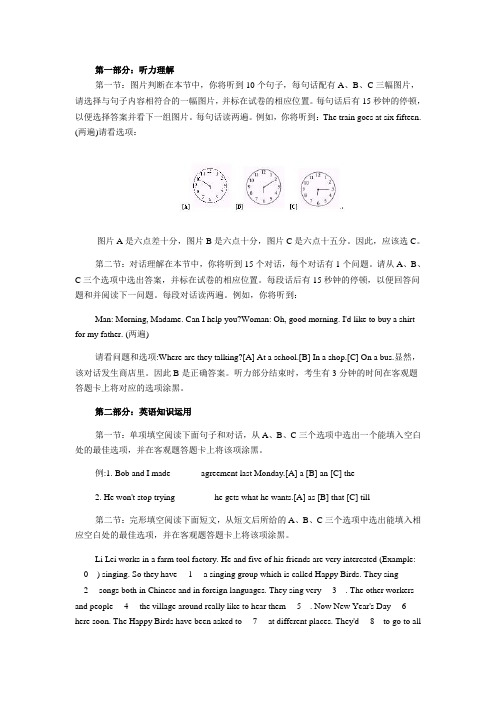
第一部分:听力理解第一节:图片判断在本节中,你将听到10个句子,每句话配有A、B、C三幅图片,请选择与句子内容相符合的一幅图片,并标在试卷的相应位置。
每句话后有15秒钟的停顿,以便选择答案并看下一组图片。
每句话读两遍。
例如,你将听到:The train goes at six fifteen. (两遍)请看选项:图片A是六点差十分,图片B是六点十分,图片C是六点十五分。
因此,应该选C。
第二节:对话理解在本节中,你将听到15个对话,每个对话有1个问题。
请从A、B、C三个选项中选出答案,并标在试卷的相应位置。
每段话后有15秒钟的停顿,以便回答问题和并阅读下一问题。
每段对话读两遍。
例如,你将听到:Man: Morning, Madame. Can I help you?Woman: Oh, good morning. I'd like to buy a shirt for my father. (两遍)请看问题和选项:Where are they talking?[A] At a school.[B] In a shop.[C] On a bus.显然,该对话发生商店里。
因此B是正确答案。
听力部分结束时,考生有3分钟的时间在客观题答题卡上将对应的选项涂黑。
第二部分:英语知识运用第一节:单项填空阅读下面句子和对话,从A、B、C三个选项中选出一个能填入空白处的最佳选项,并在客观题答题卡上将该项涂黑。
例:1. Bob and I made ______ agreement last Monday.[A] a [B] an [C] the2. He won't stop trying ________ he gets what he wants.[A] as [B] that [C] till第二节:完形填空阅读下面短文,从短文后所给的A、B、C三个选项中选出能填入相应空白处的最佳选项,并在客观题答题卡上将该项涂黑。
英语等级考试pets-1阅读理解模拟试题及答案
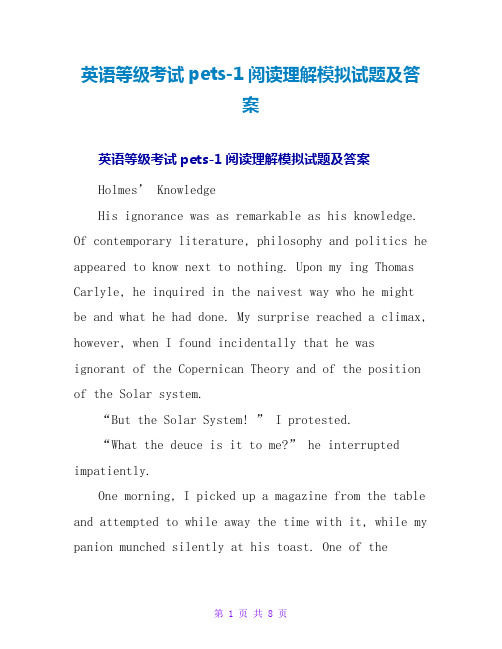
英语等级考试pets-1阅读理解模拟试题及答案英语等级考试pets-1阅读理解模拟试题及答案Holmes’ KnowledgeHis ignorance was as remarkable as his knowledge. Of contemporary literature, philosophy and politics he appeared to know next to nothing. Upon my ing Thomas Carlyle, he inquired in the naivest way who he might be and what he had done. My surprise reached a climax, however, when I found incidentally that he was ignorant of the Copernican Theory and of the position of the Solar system.“But the Solar System! ” I protested.“What the deuce is it to me?” he interrupted impatiently.One morning, I picked up a magazine from the table and attempted to while away the time with it, while my panion munched silently at his toast. One of thearticles had a pencil mark at the heading, and I naturally began to run my eye through it.Its somewhat ambitious title was “The Book of Life, ” and it attempted to show how much anobservant man might learn by an accurate andsystematic examination of all that came in his way. It struck me as being a remarkable mixture of shrewdness and of absurdity. The reasoning was close and intense, but the deduction appeared to me to be far-fetched and exaggerated. The writer claimed by a momentary expression, a twitch of a muscle or a glance of an eye, to fathom a man’s i____os t thought. Deceit, according to him, was impossibility in the case of one trainedto observation and analysis. His conclusions were as infallible as so many propositions of Euclid. So startling would his results appear to the uninitiated that until they learned the processes by which he had arrived at them they might well consider him as a necromancer.“From a drop of water, ”said the writer, “a logician could infer the possibility of an Atlantic.So all life is a great chain, the nature of which is known whenever we are shown a single link of it. Like all other arts, the science of Deduction and Analysis is one which can be acquired by long and patient study, nor is life long enough to allow any mortal to attain the highest possible perfection in it. ”This smartly written piece of theory I could not accept until a succession of evidences justified it.1. What is the author’s attitude toward Holmes?[A]Praising.[B]Critical.[C]Ironical.[D]Distaste.2. What way did the author take to stick out Holmes’ uniqu eness?[A]By deduction.[B]By explanation.[C]By contrast.[D]By analysis.3. What was the Holmes’ idea about knowledge-learning?[A]Learning what every body learned.[B]Learning what was useful to you.[C]Learning whatever you came across.[D]Learning what was different to you.4. What did the article mentioned in the passage talk about?[A]One may master the way of reasoning through observation.[B]One may bee rather critical through observation and analysis.[C]One may bee rather sharp through observation and analysis.[D]One may bee practical through observation and analysis.Vocabulary1. Thomas Carlyle 托马斯·卡莱尔 1795-1881美国作家、历史家、哲学家2. jumble (up) 搞乱,使混乱3. lay hand on (upon) sth. 抓住,找到4. at best 最好的情况下5. elbow out (off) 用胳膊肘挤出,推出6. deuce = devilwhat the deuce is it to me? 这里表示福尔摩斯的厌恶心理。
全国英语等级考试PETSPETS一级模拟题2020年(1)_真题(含答案与解析)-交互
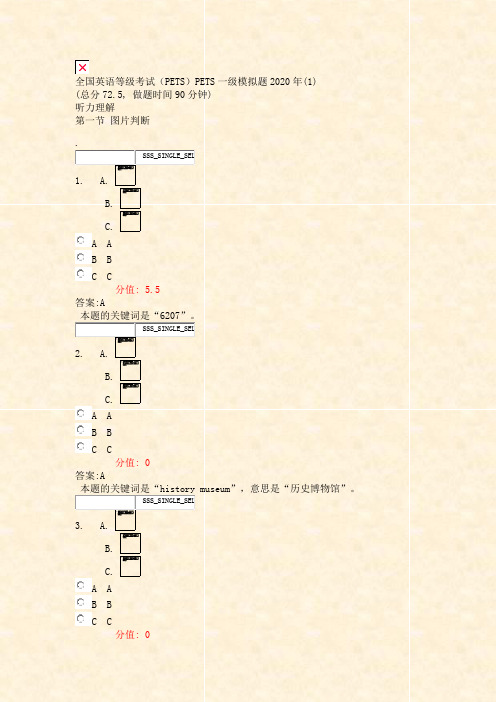
全国英语等级考试(PETS)PETS一级模拟题2020年(1)(总分72.5, 做题时间90分钟)听力理解第一节图片判断.SSS_SINGLE_SEL1. A.B.C.A AB BC C分值: 5.5答案:A本题的关键词是“6207”。
SSS_SINGLE_SEL2. A.B.C.A AB BC C分值: 0答案:A本题的关键词是“history museum”,意思是“历史博物馆”。
SSS_SINGLE_SEL3. A.B.C.A AB BC C分值: 0原文的意思是“布莱克先生离开了上海,前往北京。
”“left Shanghai for Beijing”的意思是“离开上海,前往北京”。
SSS_SINGLE_SEL4. A.B.C.A AB BC C分值: 0答案:B本题的关键词是“twenty years old”意思是“二十岁”,即图片上显示一个青年人的是正确答案。
SSS_SINGLE_SEL5. A.B.C.A AB BC C分值: 0答案:A原文的意思是“李雷比吉姆跑得慢,但比约翰跑得快。
”所以三个人中吉姆跑得最快,约翰跑得最慢。
只有图片A符合题意。
.SSS_SINGLE_SEL6. A.B.C.A AB BC C分值: 5.5原文的意思是“玛丽至少花了155美元才买了那辆自行车。
”SSS_SINGLE_SEL7. A.B.C.A AB BC C分值: 0答案:B本题的关键词是“a quarter of an hour”意思是“15分钟”。
SSS_SINGLE_SEL8. A.B.C.A AB BC C分值: 0答案:A原文的意思是“我们中午吃米饭,而不是吃面条。
”本题不但要求读者听清原文中的关键词,还要了解句子的意思。
SSS_SINGLE_SEL9. A.B.C.A AB BC C分值: 0答案:B本题的关键词是“zoo”,意思是“动物园”。
SSS_SINGLE_SEL10. A.B.C.A AB BC C分值: 0答案:C本题的关键词是“work”和“at the store”,意思是“工作”“在商店”。
(完整版)全国英语等级考试一级真题
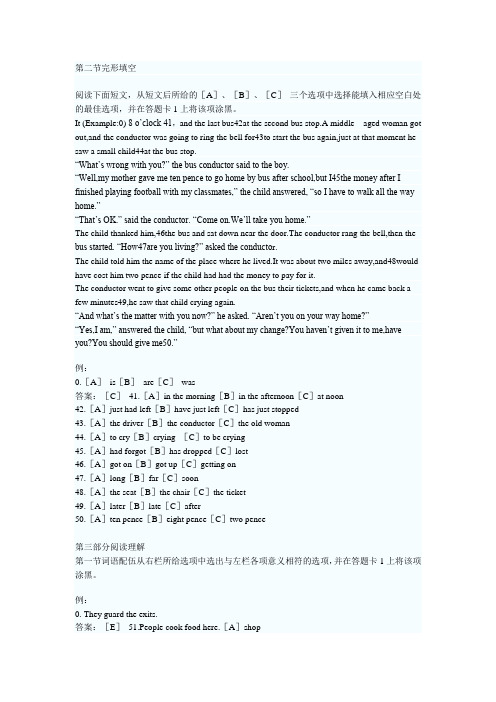
第二节完形填空阅读下面短文,从短文后所给的[A]、[B]、[C]三个选项中选择能填入相应空白处的最佳选项,并在答题卡1上将该项涂黑。
It (Example:0) 8 o’clock 41,and the last bus42at the second bus stop.A middle aged woman got out,and the conductor was going to ring the bell for43to start the bus again,just at that moment he saw a small child44at the bus stop.“What’s wrong with you?” the bus conductor said to the boy.“Well,my mother gave me ten pence to go home by bus after school,but I45the money after I finished playing football with my classmates,” the child answered, “so I have to walk all the way home.”“That’s OK.” said the conductor. “Come on.We’ll take you home.”The child thanked him,46the bus and sat down near the door.The conductor rang the bell,then the bus started. “How47are you living?” asked the conducto r.The child told him the name of the place where he lived.It was about two miles away,and48would have cost him two pence if the child had had the money to pay for it.The conductor went to give some other people on the bus their tickets,and when he came back a few minutes49,he saw that child crying again.“And what’s the matter with you now?” he asked. “Aren’t you on your way home?”“Yes,I am,” answered the child, “but what about my change?You haven’t given it to me,have you?You should give me50.”例:0.[A]is[B]are[C]was答案:[C]41.[A]in the morning[B]in the afternoon[C]at noon42.[A]just had left[B]have just left[C]has just stopped43.[A]the driver[B]the conductor[C]the old woman44.[A]to cry[B]crying [C]to be crying45.[A]had forgot[B]has dropped[C]lost46.[A]got on[B]got up[C]getting on47.[A]long[B]far[C]soon48.[A]the seat[B]the chair[C]the ticket49.[A]later[B]late[C]after50.[A]ten pence[B]eight pence[C]two pence第三部分阅读理解第一节词语配伍从右栏所给选项中选出与左栏各项意义相符的选项,并在答题卡1上将该项涂黑。
全国英语一级试题-含答案

全国公共英语等级考试英语一级(1级)模拟试题含答案第一节: 单项选择从A.B.C.D四个选项中, 选出可以填入空白处的最佳选项, 并在答题卡上将该项涂黑.1.----.wil.yo.b.abl.t.finis.th.jo.thi.week----- ___________ , but I'm not skilled enough, you know.A..can'.sa.s.B..expec.soC.I'.sur.soD..don'.kno.so2.W.arrive.a.th.statio.______.late.o.w.th.bus.A.to.much.woul.catchB..littl.too.ha.caughtC.muc.too.woul.hav.caughtD.to.much.woul.hav.caught3.I.i.th.watc.yo.wan.________A.t.hav.i.repairedB.t.repai.itC.t.hav.repairedD.t.hav.repaire.it4.Th.tw.thieve.fle.th.tow.separately.______..bag.A.eac.carryingB.whos.tha.watc.isC.whos.watc.i.thatD.whos.watc.is5.Th.littl.bo.can'.tel.________.A.whos.i.tha.watc.B.whos.tha.watc.isC.whos.watc.i.tha.D.whos.watc.is6.I..bab.bir.stay.______.fo.tw.o.thre.week.afte.leavin.th.nest.i.ha..f ai.chanc.o.becomin.a.adult.A.livingB.livelyC.aliveD.live7.W.wil.no.attac._____.w.ar.attacked;i.attacked,w.wil.certainl.counter-attack.A.ifB.whenC.unlessD.eve.if8.Yo.ca.tak._____.sea.yo.like.A.n.matte.whatB.n.matte.whichC.whatD.whichever9.._____.t.spea.t.yo.al.thes.days.A.wantedB.hav.wantedC.shal.wantD.shal.b.wanting10.A burning cigarette he threw into the wastepaper basket ______ fire to the hotel.A.mad.B.se.C.cause.D.caught11."Do you hear someone knocking at the door""Yes..did..hear.hi._____.thre.times."A.knockin.B.knocke.C.bein.knockin.D.knock12.Peter, John and Tom each ______.A.sa.the.cam.firs.B.say.the.cam.firs.C.say.h.cam.firs.D.sa.cam.fir st13.Through long power lines electricity goes ______.A.t.th.plac.neede.B.ther.i.i.neede.C.wher.i.i.neede.D.whic.i.i.need ed14._____.fro.th.appl.tree.A.I.dow.fellB.ther.i.i.neededC.Dow.fel.itD.Fel.i.down15.The service in this restaurant is very poor; there are notenough waiters to wait ______ customers.A.o.B.fo.C.wit.D.to第二节: 完形填空阅读下面短文, 从短文后所给各题的四个选项(A.B.C.D中选出能填入相应空白处的最佳选项, 并在答题卡上将该项涂黑.te.Wilso.1.th.offic.whe.sh.go.there.Hi.secret ar.tol.he.h.1.bac.i..fe.minutes.Sh.1.si.dow.an.wai.fo..fe.minute.i. oute.office."I'l.neve.ge.thi.job,.sh.1.herself.Fo..momen.sh.wante.t.2.th.buildi ng.Jus.then.Wilso.cam.2.th.doo.an.hurrie.int.hi.office..fe.minute.2.hi.secretar.too.Lind.i.an.introduce.her.Lind.apologize.2..Wilso.didn'.see.t.2..The.chatte.casuall.(随便地.fo..fe.second.an.the.2..H.2.he.lette.o.application."You'v.neve.worke.i.radi.o.televisio.before.2. "h.said.No.sh.wa.2.tha.sh.woul.no.ge.th.job.Wilso.aske.he.2.ques tions..3.h.seeme.impresse.wit.he.othe.qualifications(资格).Sh.wa.3.whe.h.aske.he.i.sh.coul.star.soon.".wonde.i.you'.min.3.nex.month.h.aske.3...3.seeme.sh.ha.go.th.jo.3..16.A.ha.lef. B.ha.lef. C.wa.lef. D.woul.b.leavin.17.A.ha.bee. B.came C.wa. D.woul.be18.A.shoul. B.ha.t. C.woul. D.wa.abl.to19.A.tol. B.spoke C.sai. D.talked20.A.ru.ou. .ru.of C.ru.ou.o. D.ru.awa.21.A.throug. B.acros. C.cros. D.alongtes. s. te terte te te te24.A.mind B.listen C.notice D.hear25.A.too.dow.wit.businessB.cam.dow.t.business.C.settle.dow.wit.businessD.go.dow.t.business26.fille.out B.too.ou. C.sen.ou. D.thre.away27.A.haven'.yo. B.d.you C.hav.yo. D.don'.you28.A.eve.mor.sur. B.muc.sure C.eve.sur.o. D.sur.of29.A..fe.suc. B..fe.more C.muc..fe. D.mor..few30.A.A.he.surpris. B.T.he.surprised C.Fo.he.surprise.D.T.he.surprise31.A.eve.mor.surpris.B.eve.muc.surprise.C.eve.mor.surprise.D.eve.muc.surprised32.A.startin. B.t.start C.star. D.started33.A.b..smil. B.wit..smile C.b.smil. D.wit.smile34.A.I. B.This C.Tha. D.He35.A.no.a.al. B.afte.all C.al. D.afte.that第三部分: 阅读理解阅读下列短文,从每题所给的四个选项(A、B、C和D)中,选出最佳选项, 并在答题卡上将该项涂黑。
- 1、下载文档前请自行甄别文档内容的完整性,平台不提供额外的编辑、内容补充、找答案等附加服务。
- 2、"仅部分预览"的文档,不可在线预览部分如存在完整性等问题,可反馈申请退款(可完整预览的文档不适用该条件!)。
- 3、如文档侵犯您的权益,请联系客服反馈,我们会尽快为您处理(人工客服工作时间:9:00-18:30)。
全国英语等级考试(一级)模拟试题全国英语等级考试(一级)模拟试题第一部分听力(略)第二部分英语知识运用第一节单项填空阅读下面的句子和对话,从三个选项中选出一个能填入空白处的最佳选项,并在答题卡将该项涂黑。
26. He is badly ill. We must _____ a doctor at once.A. send toB. send forC. send away27. The hospital _______ last year.A. builtB. was builtC. has been built28. When I came into the classroom, the teacher _____something on the blackboard.A. is writingB. was writingC. wrote29. --How long have you been ill? --A. Since last weekB. A week agoC. Once a week30. Everybody is here _____Mike.A .not B. and C. except31. We don’t understand the passage ___ there are a few new words in it.A. andB. unlessC. because32. The TV set is very nice. How long have you _______it?A. boughtB. hadC. taken33. --- Shall I get one more apple for you, Dad?---Thanks, but you _______. I’ve had enough.A. may notB. must notC. needn’t34. --- _________is your shirt?--- It is 100yuan.A. How manyB. How muchC. How long35. He is _______kind an old man that all the children like him.A. veryB. soC. such36. Either Jim or Sam ______going to help the farmers with the orange harvestthis afternoon.A. wasB. wereC. is37. We have studied for two hours. Let’s stop .A. have a restB. to have a restC. having a rest38. We won’t go to Great Wall if it ________tomorrow.A. rainsB. rainC. will rain39. No book and no pen______in the bag.A. isB. areC. has40. Please give me ______.A. two cups of milksB. two cup of milkC. two cups of milk第二节完形填空阅读下面短文,从短文后所给的三个选项中选出能填入相应空白处的最佳选项,并在答题卡1上将该项涂黑。
It’s fine spring weather now. The trees and fields are_____. The farmers are busy _____in the fields. The birds are singing happily in the forest and the____ are coming out. The sun is shining warmly and ____ is a warm wind. Some little boys are flying kites in the fields. They like the wind because they can fly kites____.It’s a lovely summer morning. The sun is just coming up the hills in the_____. It’s early morning and cocks(公鸡)are crowing(啼鸣)on the farm. Now it’s midday and it’s_____ very hot. The sun is shining brightly. There are hardly any clouds in the sky. Some children are ____ in the river. The farmers are weeding the fields now. The sun is going_____ in the west. It’s getting dark and the farmers are going back to the farm house. It’s_____ now and it’s getting cooler. Soon you can see thousands of bright stars in the sky.41. A. yellow B. red C. green42. A. talking B. working C. playing43. A. leaf B. flower C. flowers44. A. there B. that C. it45. A. high B. highly C. far46. A. east B. west C. north47. A. going B. coming C. getting48. A. enjoying B. working C. swimming49. A. up B. down C. on50. A. morning B. afternoon C. evening第三部分阅读理解第一节词语配伍从右栏所给出选项中选出与左栏各项意义相符的选项,并在答题卡1上将该项涂黑。
51. People put clothes in it. A. wine52. People drink it. B. umbrella53. People use it in a rainy day. C. table-cloth54. People study them at schools. D. taxi55. People cover it over the table E. wardrobeF. subjectsG. hotel第二节短文理解1阅读下面的短文,从A(Right)、B(Wrong)、C(Doesn’t say)三个判断中选择一个正确选项,并在答题卡1上将该项涂黑。
Many people begin their day by reading newspapers. In this way they learn what is going on in the world. Sometimes, however, they don’t have time to read the news carefully. Most newspapers have several sections, especially on Saturdays and Sundays when the edition is longer than usual.Magazines also bring people information from around the world. Some areweekly magazines, others are monthly. Some are mainly for men, others for women, and there are children’s magazines, too. In a word, there are magazines for every taste and interest.56. Many people read newspapers in the evening.A. Right.B. WrongC. Doesn’t say.57. People read newspapers in order to study.A. Right.B. WrongC. Doesn’t say.58. People need more time to read Saturday or Sunday newspapersA. Right.B. WrongC. Doesn’t say.59. Magazines are quite different from newspapers.A. Right.B. WrongC. Doesn’t say.60. Everyone have their own kinds of magazines to read.A. Right.B. WrongC. Doesn’t say.第三节短文理解2阅读下列短文,从A、B、C三个选项中选择一个正确答案,并在答题卡1将该项涂黑。
请根据下面的短文回答第61~65题;There are many cats in England. English people are very friendly to all their cats.Mary was a school teacher. She had a beautiful white cat, and she loved it very much. But a very sad thing happened one day. A rich man’s car over the cat, and that was the end of the cat. Mary ran out onto the road.“Oh, you poor, dear thing!” She cried. “What shall I do without you? You were the light of my life.”The rich man stopped his car and came back. He put his arms around Mary and said, “I’m very sorry about this accident. Please let me…”“You don’t know!” Mary cried. “She was a wonderful pupil!”“A pupil?” the man asked. “this cat? What do you mean?”“You couldn’t buy that cat for all he money in England!”Mary said, “I taught her every day. That cat could talk, sir!”“Then I must help you,”the man said. He took some money from his pocket. “Here, have this. Three hundred pounds. Is it enough? Will you forgive me?”Mary took the money. “Thank you,” she said, “I’ll get another cat. Then I must begin all the work again.”The rich man went away in his car. A woman said to Mary, “Was it true, Madam?” Mary answered, “My cat had many difficult lessons. At last she could say her name in Chinese.”Everyone laughed.61. What was Mary’s job?A. She taught cat.B. She was a teacher.C. She bought and sold cats.62. What does “the end of Mary’s cat” mean?A. The cat had no more lessons.B. The cat began to live with the rich man.C. The cat died in the accident.63. What did the rich man do after the cat was killed by his car?A. He gave Mary another beautiful cat.B. He gave Mary some money.C. He gave Mary nothing.64. What did Mary say about her cat? She said that______.A. her cat could cookB. her cat could talkC. her cat could fly65. What could Mary’s cat say? She could say_____.A. the English word “cat”B. Mary’s nameC. “cat” in Chinese请根据下面短文回答第66~70题:Mike went to a barber’s shop and had his hair cut, but when he came out, he was not happy with the result. When his friend Bob saw him, he laughed and said, “What has happened to your hair, Mike?”Mike said, “I tried a new barber’s shop today, because I wasn’t quite satisfied with my old one, but this one seems even worse.”Bob agreed, “Yes, I think you’re right, Mike. Now I’ll tell you what to do when you go into a barber’s shop next time: look at all the barber’s hair, find the one whose hair looks the worst, and then go straight to him.”“Why shall I go to him?” Mike asked. “But that would be foolish!”“Oh, no, it wouldn’t,” answered Bob. “Who cut that man’s hair? Just think it. So you know he can’t be the worst barber.”66 When Mike went out of the barber’s shop, he was not happy because______.A. the barber hadn’t cut his hair wellB. the barber hadn’t cut his hair at allC. the barber had cut his hair carefully67. Mike thought that_______.A. the new barber’s shop was as good as the old oneB. the new barber’s shop was better than the old oneC. the new barber’s shop was worse than the old one68. Bob tells Mike to go straight to______ if he goes into a barber’s shop next time.A. the barber who is freeB. the barber whose hair looks the bestC. the barber whose hair looks the worst69. Mike thought it would be_____ to go to the barber with the worst hair.A. cleverB. foolishC. right70. This story tells us that_________.A. a barber always cuts his own hairB. a barber never cuts his own hairC. we should have our hair cut at home第四部分写作第一节改写句子下面是关于Mark Twain的三对句子,每对句子中,第一句是原句,第二句是对第一句的改写。
